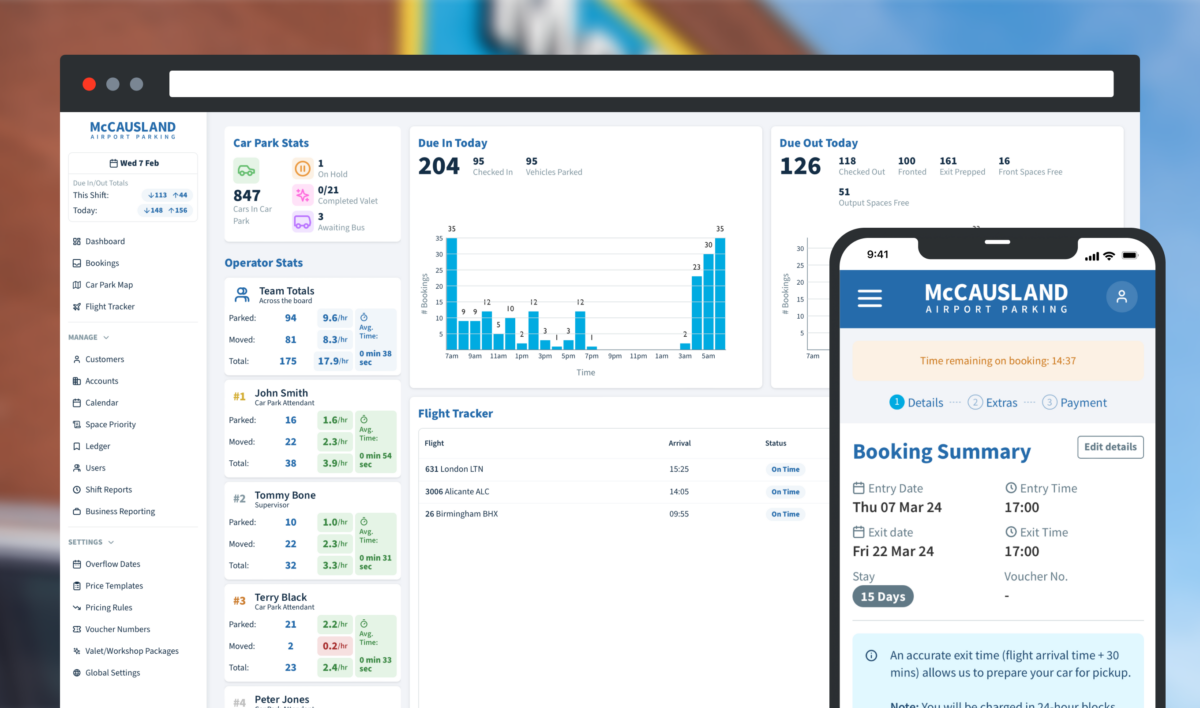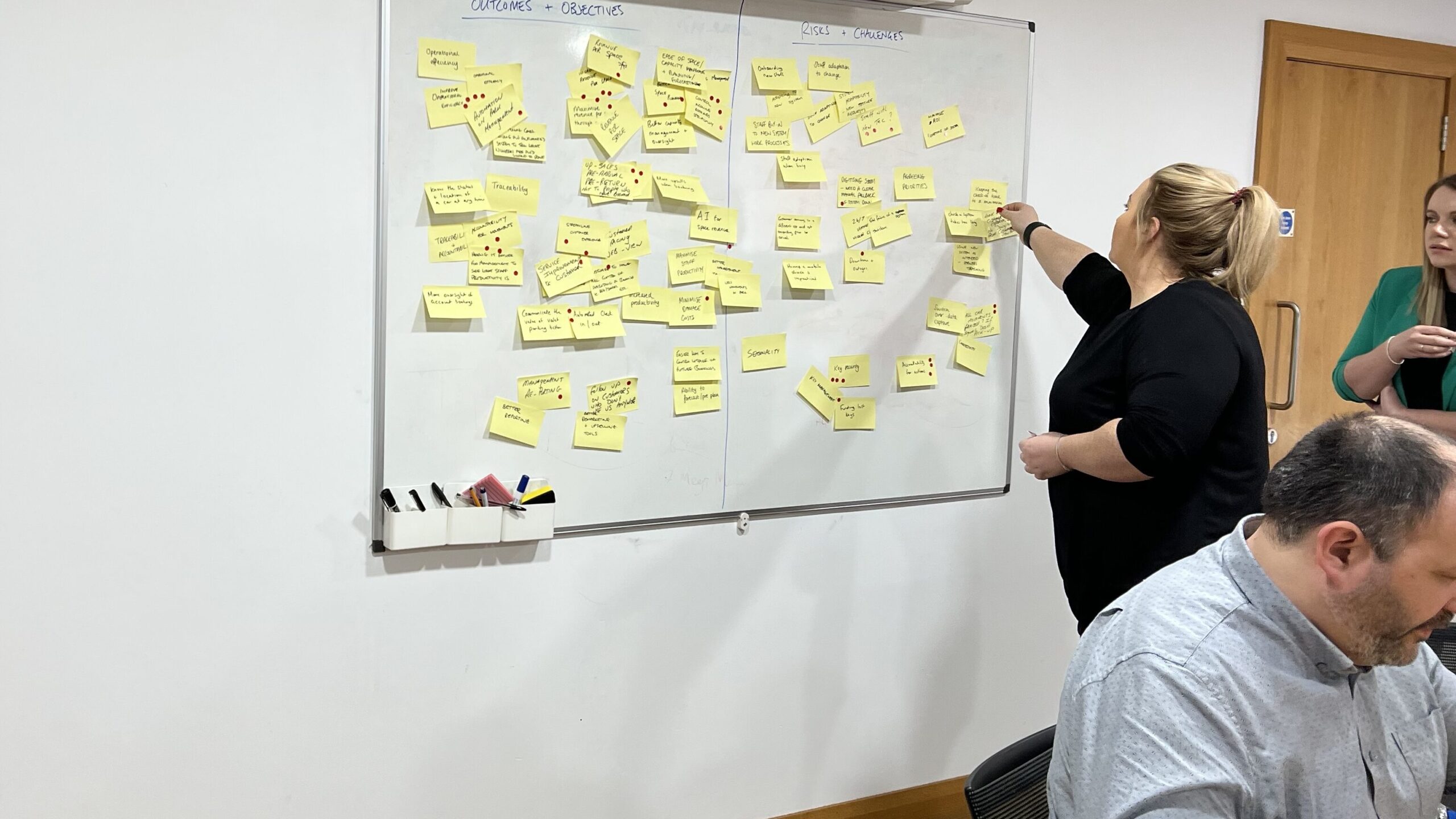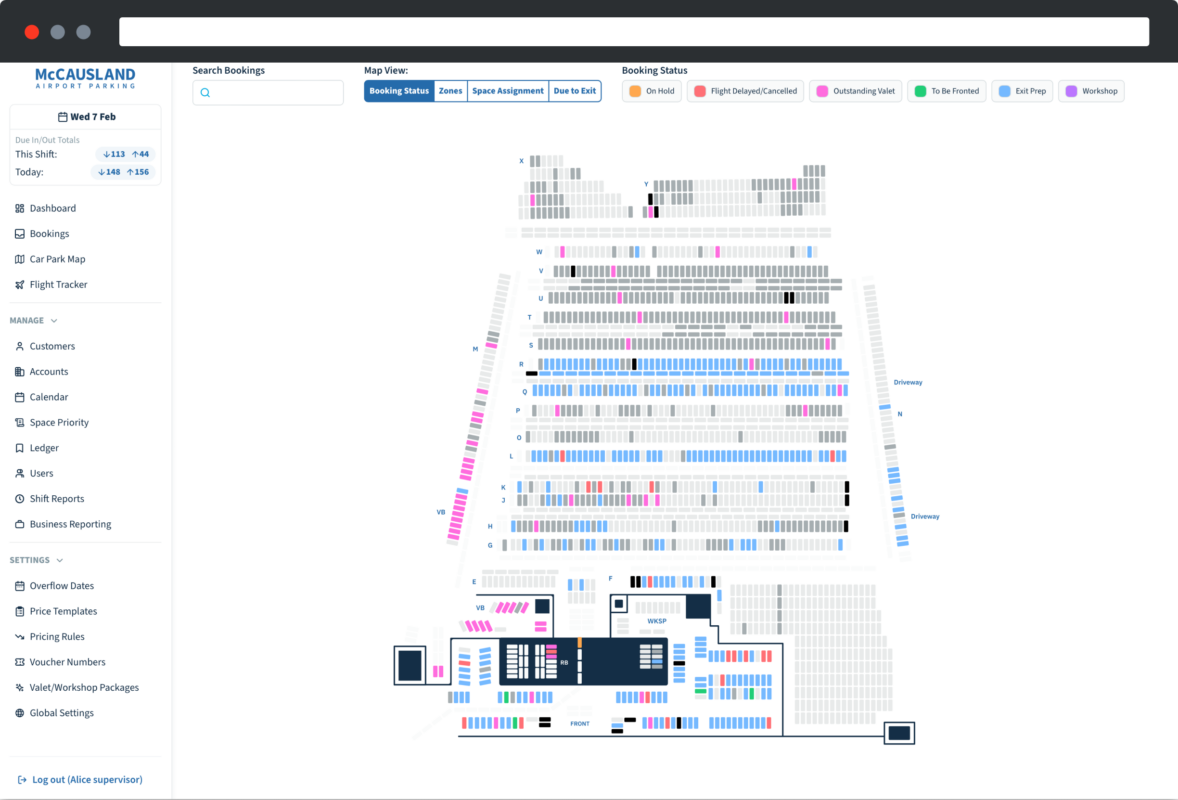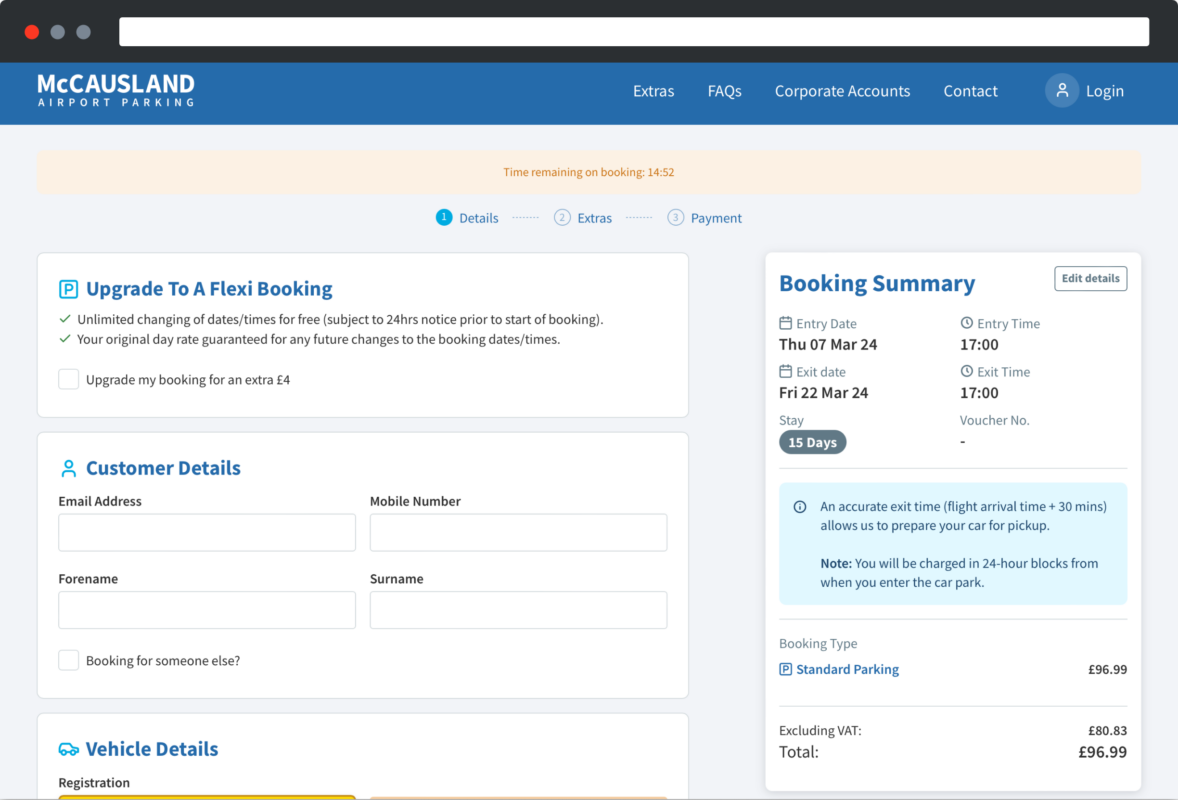
The Challenge
McCausland Airport Car Park became a GCD client in early 2023, undertaking an initial Discovery Sprint. The objective of the Discovery Sprint was to gain an understanding of what a feasible solution would entail for the complete rebuild of their current online booking and car park management system (CPMS).
The business offers a valet parking service, which comes with a range of complexities. From a staff perspective, they face two primary challenges:
- Ground space usage and tracking
- Managing car washing and mechanicing services
To fully utilise ground space available, cars are parked in both regular bays but also in laneways when the car park begins to reach capacity. At peak times, cars can be twenty vehicles deep in a row! Car washing and mechanicing services are also offered, so cars must be moved in and out of these stacked rows. Finally, all cars must be moved to a limited collection zone for customer collection, with a ‘just in time’ process employed to save space. These tasks were completed manually by staff.
For customers, they also faced a number of pain points:
- Slow check-in process, particularly during peak times
- Delays to flights resulting in their car not being ready
- Availability of bus transfers (particularly at night) due to flight delays
- Poor user experience of online booking system
This unique set of pain points had to be addressed with a software solution that would enhance and improve operational and logistical inefficiencies for staff and customers.
The primary business outcomes for the project were:
- Improve operational efficiency
- Improve capacity management
- Ease check-in pressures
- Focus on accountability and traceability
- Maximise revenue per space
- Increase up-sells
- Harmonise system & physical processes
- Build system around seasonal changes
- Improve customer experience
- Improve key management
- Secure system with longevity
The Solution
Starting with the Discovery Sprint, GCD and the McCausland Airport Car Park team embarked on a 4 week collaborative process to deep dive into the business pain points and user behaviours. Through the process of discovery, research, ideation and prototyping a vision for a viable software solution was presented through an interactive prototype, alongside a set of prioritised requirements and a cost for building a solution. This process ensures a full understanding of the business, ensures the teams are on the same page and outlines a clear plan to move forward.

From this informed position we embarked on the full development project to build two bespoke, integrated systems. A car park management system (CPMS), and a customer-facing booking site to place and manage bookings and additional services.
To address the main pain points around ground space usage and car tracking, we developed a new automated system to suggest the best location to park a car. This functionality had to appreciate the multi-factored considerations weighed by human operators, who previously made judgments about space allocation manually, in a paper-based process. Developing this feature was tricky as staff had decades of experience and personal approaches to space management. During development we facilitated a series of additional workshops with the McCausland Airport Car Park team to uncover the needs of users and plan solutions, we then worked through a number of iterations to fine tune these features.

Each staff member now has a mobile device (rather than paper) that is fully integrated with their existing task management platform, Footprint, to automatically optimise tasks and provide all the information required to manage the car park and their car wash and service workloads.
Tracking cars was a previous pain, particularly if they have been moved from their original position, the innovation now provides a visual map of the car park which can be searched to pinpoint any vehicle, and the ability to view the full booking details. The solution also provides full traceability for all car moves, which are logged via operator handsets.
Another new feature is performance tracking, which measures the number of cars parked, moved and checked in per hour, plus a shift dashboard. These features work to gamify workloads and offer a motivational leaderboard for staff.
The new solution has also resolved customer pain points by improving the check-in process, which is now completed on mobile devices. Staff are able to check in multiple cars, particularly useful during peak times when a queue is often formed. It also entirely eliminates the need for customers to queue a second time at the front desk – previously this was needed to confirm details, print a customer ticket, and attach a paper ticket to keys. All of this has been digitally transformed. Car keys are tagged with a QR code keyring while the customer is still in the driver’s seat, and a digital ticket is emailed, so all they have to do is exit their vehicle and catch their flight.
Integrations
We utilised a number of integrations to make customer and staff use of the system that much more seamless and time efficient. We integrated with the DVLA’s API to offer automated population of vehicle details based on vehicle registration when customers book, improving the accuracy of information provided, as well as saving time. This information is also available at all times on the booking, improving car tracking and maintaining an efficient check-in process.
Using customer return flight numbers and an integration with AirLabs, we developed a feature that flags delays to bookings on the car park map, ensuring the limited space in the customer collection zone is used as efficiently as possible and that the customer vehicle is ready at the new pick-up time. This is also used to ensure that transfer from the terminal to the car park is available to customers.
The tech stack used the latest version of Vercell’s Next.js framework, paired with TRPC for API calls, and Prisma ORM for database operations. These tools allowed us to develop a future-proofed platform that balanced development and operational efficiency with the power and longevity to get the job done now, and set the customer up for ongoing enhancements and improvements. Design was mobile-first, given that most customers are expected to book from their phone, and staff will be on-the-go with handheld devices. But also offers a rich experience on desktop, for supervisor forecasting, business reports, and power-user management.

The Results
The new systems were successfully launched with minimal disruption to the busy airport car park, which operates 24/7/364, and customers who are already facing the usual stresses of travel, a huge achievement for the team. We managed the go-live of a completely rebuilt and radically new system, transitioning cars in-situ to a newly formatted parking layout, plus on-boarding of staff and customers to entirely new processes. All with less than 30 mins of downtime.
The digital solution has realised huge efficiency and improvements to how staff work. Particularly, during the check-in process, which now saves approx 2-7 mins per customer, depending on busyness levels. That’s a huge average of 7125 hours of customer and staff time saved in a typical year of check-ins at the car park!
“Our new customer booking and car park management system has seamlessly integrated and streamlined our processes, improving check-in times, customer service and ground space usage. Staff are enjoying the benefits of real-time tracking, insightful analytics, and automated task management. The GCD team were excellent to work with, from the initial Discovery Sprint, which we found very beneficial in aligning our team and defining our requirements, to the development of our new CPMS and online booking system.” – Emma, Director at McCausland Airport Car Park